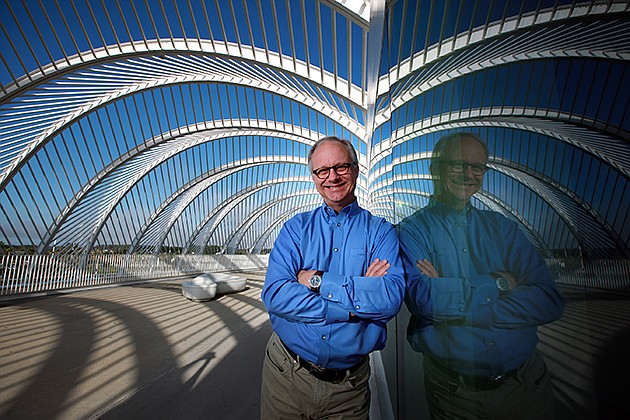- November 24, 2024
-
-
Loading

Loading

Polk County is poised to be a leader in the study of transportation technologies in the construction of SunTrax.
It's a 2.25-mile oval track near Florida Polytechnic University in Auburndale that will be used for testing tolling technologies and will allow for research and development of automated vehicles and intelligent transportation systems.
Florida Polytechnic University President Randy Avent sees the $56 million project as a tremendous opportunity to encourage auto manufacturers to set up shop in Polk County. “These test sites will do a lot to attract industry. We are trying to start growing [the] high-tech economy along the corridor,” he says. “In my experience when you have a facility like this, industry wants to be close by.”
The joint venture between Florida Poly and the Florida Department of Transportation comes at a time when many things are changing in the transportation industry. “We are on the cutting edge,” says Paul Satchfield, project manager with FDOT. “I don't believe there is anything like this for tolling, and the wave of driverless cars is coming.”
Why choose Auburndale and Florida Poly? Just like the tide of large-scale distribution projects in area, location is key. About 400 acres were available in the area, it's close to the turnpike office and right next to Polk Parkway - Polk County's toll road.
“We are excited to have this in Auburndale,” says Amy Palmer, community development director with the city, adding that the property has been identified as a future area for business. “Auburndale works with Florida Polytech and the Central Florida Development Council to recruit high-tech companies.”
And that's what county and city leaders want. “It's very possible Auburndale may be the center of autonomous vehicle testing in the state,” says Central Florida Development Council President Sean Malott. “We are very focused on creating opportunities for people to earn higher-level wages. As more property becomes available in the surrounding area, it opens up doors for more companies.”
And there are hundreds of acres adjacent to the facility that can be used for future development.
Construction of the facility will begin in the spring. The facility will allow for high-speed testing, including multiple lanes and parallel tolled express lanes like the ones in Central Florida. “We always have to test tolling equipment and software,” Satchfield says. “We want to test (the new technology) at highway speeds, and this can accommodate that.”
Florida's Turnpike Enterprise has more than 5.5 million SunPass customers traveling on toll roads. The group processes more than 1.3 billion toll transactions each year.
After the track is constructed, the next phase will be developing the infield track where autonomous vehicles will be tested. Avent sees this as an opportunity for the school.
“There will be plenty of projects to work on, and our students will be heavily involved,” he says. “When we were founded, we were chartered to be an applied research and technology development university. We have project-based curriculum, and this will help grow the university.”
The infield testing will likely include a learning laboratory, simulated city center, suburban and rural roadways, interchange ramps, different types of pavements and other testing areas. University students will be able to conduct research, development and testing for data and security, vehicle safety and equipment certification. New
concentrations will also be added to degree programs.
It made sense to partner with a STEM school, says Satchfield. “What they teach there fits in with toll and autonomous vehicle testing,” he says, adding that partnerships with other Florida universities most likely will happen as the project develops.